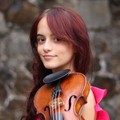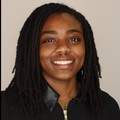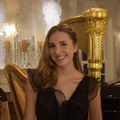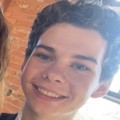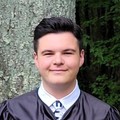As I prepare myself for my upcoming graduation, I reflect upon the decision I made to pursue a career in music education. Seeing first hand the positive impact music education has on students, I know that I have made the best choice for a challenging, but rewarding career.
I have had the privilege to student teach at two different schools, teaching K-5th general music and 7th-8th grade band. During my student teaching experience, I witnessed how music can transform a students behavior and performance in and out of the music classroom.
Being truly driven about teaching gives me an opportunity to make a significant impact on the lives of my students. I would not be where I am today without the support and care of my past educators who had a great passion for teaching music, which inspired me to pursue it as a career. I believe that in order for my students to have an authentic connection and love for what they are learning, I must love what I am doing. This is easy for me because I have a deep love and passion for both music and teaching. Music is universal, and I find joy in knowing that I am able to share that with future generations. Being able to connect with my students includes getting to know my students. This includes adapting to relevant lessons, adhering to student interests, and emphasizing important life skills such as: empathy, understanding, discipline, communication, collaboration, and accountability.
Creating a safe space for learning and fostering creativity is such an important aspect for my music classroom. Most of what we do as musicians is very personal and often vulnerable because we are tapping into our emotions and creating something new. Music is a different subject because of this. In order to have your students feel welcomed and willing to participate, there needs to be an environment in which your students can grow. By emphasizing respect, inclusivity, perseverance, and kindness, students will have the opportunity to foster their creativity and learning into their music. Having my students understand that mistakes are just opportunities to grow is crucial to make the point of respect and perseverance in the music classroom. As not only an educator, but an avid performer, I know what it takes to persevere through challenging situations and to adapt to your environment.
Having dealt with some traumatic experiences in my own life, I know how much they can impact your learning, and what a difference an empathetic teacher who is willing to work with a student’s needs can make. By incorporating trauma-informed practices, I make an effort to recognize and respond to my students in a non-judgmental and empathetic way. This encourages to establish a sense of trust and safety in the classroom. Every student comes with their own challenges, learning styles, and strengths, and it is imperative to be adaptable to meet them where they are. Having awareness of their progress helps your students to be successful. In music, it is easier to identify when a student is excelling or struggling. Being flexible promotes an understanding of practice and perseverance, as well as building their confidence.
Ultimately, my role as a music educator is to help foster the skills of student musicians on their journey of learning. My students will understand the value of music, creativity, and how to be a good person. Teaching offers me the opportunity to make a real difference in the lives of my students, and I am excited to continue to make a positive impact in my music classroom.
My journey with music began early. I started piano at age three and transitioned to cello at age eight. Music has always been my outlet—how I express what words cannot. The cello’s voice, often said to be closest to the human voice, is resonant, unguarded, and deeply emotional. That expressive power drew me in, and over time, my connection to the instrument became a full commitment to a career in music. I was never the child who had to be reminded to practice; I practiced because I truly found joy and passion in playing. What began as childhood lessons evolved into a discipline rooted in listening, empathy, and communication.
Today, I’m a dual-degree student at Bard College and the Bard Conservatory of Music, enrolled in a five-year program in music performance and anthropology. I study cello with Raman Ramakrishnan, formerly of the Daedalus Quartet and the Horszowski Trio, and previously studied with renowned pedagogue Peter Wiley. Their mentorship has helped me shape my voice as a performer and reminded me that, as musicians, we are also actors, translating the music for our audience just as actors embody their roles on stage.
Henry Wadsworth Longfellow wrote, “Music is the universal language of mankind.” I interpret this to mean that music speaks directly to our core as human beings. It bypasses linguistic and cultural boundaries, allowing us to understand one another through sound alone. Classical music, in particular, tells stories not through words, but through feeling. On a youth orchestra tour through Spain and Portugal in 2019, I played for audiences who didn’t share my language, but we understood one another in the silence after each piece. That resonance—unspoken, yet unmistakable—is the essence of Longfellow’s idea. Music makes connection possible, even across difference.
As a student of both music and anthropology, I’m especially interested in the intersection between music and culture—how music reflects identity, memory, and belonging. I see my future not only on stage, but also in classrooms, community centers, and collaborative spaces where music is used as a tool for education, empathy, and healing. I want to help dismantle the notion that classical music is only for a privileged few. Whether through performance outreach, youth mentorship, or community workshops, I hope to make this art form more inclusive and accessible, especially for underrepresented audiences.
As a musician, I’m not only a performer—I’m a listener, collaborator, and learner. Music has taught me how to be present, how to embrace differences, and how to meet uncertainty with curiosity. These are the same values I bring to my anthropology studies and the ones I intend to carry into my professional life. I want to use my experience not just to perform, but to invite others in—to create spaces where people can see themselves reflected in sound.
The Audrey Sherrill & Michael D’Ambrisi Music Scholarship would help me continue cultivating this path without financial barriers. It would support both my technical development and my broader vision of music as a force for connection and dialogue. Music has shaped how I understand the world—and through it, I hope to help build a world that listens more deeply.
As a young girl living among a myriad of influences from my Dominican, Spanish, and American cultures, I was surrounded by a diverse repertoire of rich and soulful music. From the beginning, music helped shape both my cultural and artistic identity, and it gave me a conduit for creative, heart-centered expression.
In its endless vibrant forms, from Broadway to bachata to hip-hop, music has helped me develop my emotional intelligence and nurture a new vulnerability that comes from a place of inner strength. Music, in all of its forms, has become the means through which I channel this powerful thunder I have in me - my curated Spotify playlists that range from James Brown to Juan Luis Guerra to Olivia Rodrigo, to my car-ride Broadway-ballad belting sessions, and to my truest voice, my violin.
Throughout the seasons of anxiety that have come from the pressure to succeed, music has been my solace and the way I have been able to channel my complex feelings, allowing me to blossom into a more empathic and self-assured young woman.
I’ve been lucky enough to have had incredible mentors that have exemplified excellence and true authentic artistry as people of color, and they’ve allowed me to see the incredible array of possibilities for my future, which has already pushed me to places far beyond my imagination. Their work in breaking down access and visibility barriers for students like me is the reason I am able to pursue what I love most in the world.
At the core of my goals is a hunger to tell compelling stories that not only excite and help my audiences make sense of their own passions and emotions, but also allow them to empathize with people who have contrasting lived experiences. Being steeped in multiple cultures has given me a profound understanding of how important it is for me to share the depth of my unique worldly perspective. I envision myself using this to amplify artists who have been historically and systemically excluded from the classical canon and to engage audiences who have not previously had access to the established classical music world, building bridges for new generations of musicians and listeners to come together and bring a fresh, necessary vibrance to this beautiful and culture-defining art form.
Through my conservatory studies, I want to continue to develop the expertise to effectively communicate my musical ideas and strengthen the leadership and teamwork skills that are required to achieve my career aspirations. I have no shortage of perseverance in me, and I have an abundance of ideas to share with the world.
Wide brown eyes, full cheeks and two crooked front teeth. Everyone could see those two teeth as my smile grew immensely, making those cheeks even fuller. Only the anticipation of learning vocals, attending to dance intensives, and preparing for a performance could create a smile to grow that wide. My eight-year-old self strutted into musical theatre camp practically jumping up and down. I was intimidated by the teachers and counselors analyzing the crowd, but I was also eager to be in a room with people who were also obsessed with singing.
Prior to this camp, I had never performed on stage. When I was backstage, the feeling of uneasiness hit me like a truck. I was shaking uncontrollably. I sang for my family mostly, and they told me I was good. As a child, you believe everything you’re told, and I believed I was so talented that I was going to be walking across a red carpet one day. Even if I was a tad full of myself, I know having that confidence was the extra push I needed. I worked up enough courage to step onto that stage. I don’t recall the actual performance, but I remember the warmth of the lights and the golden beam across my face. A wave of comfort washed over me. This blanket of security prompted me to continue performing in more camps, intensives and musicals for the next seven years.
During the summer of 2021, I worked as a counselor at the musical theatre camp where I began one of my favorite pastimes. A mob of about forty kids rushed through the door. I’ve always been great working with kids due to the fact I have three younger siblings. I scanned the crowd and found a new pair of brown eyes, full cheeks and two crooked front teeth. Her name was Hanna and she was nine years old. Her face beamed with excitement, and she couldn’t stop jittering. It was strange how familiar she seemed. We had never met before, but I knew her. She was eight-year-old me. That night, I went to watch my little brother’s baseball game and I made eye contact with those big brown eyes again. Turns out, our brothers played for the same team! We kept each other entertained for six innings. She asked me about my experiences in theatre. I told her all about the shows I had performed, the friends I had made and how I had developed a passion for music.
For the remainder of the four-week camp, Hanna and I became inseparable. Every day she would fly through the doors and give me the biggest hug. She always looked to me for reassurance, even though she didn’t need it because that little girl is extremely talented. I adored all kids I worked with, but I felt obligated to look after Hanna. She was like my little sister, and I wanted to continue to foster her love for music. Everytime she rehearsed, I would watch her brown eyes widen and her crooked teeth instantly appear. Hanna’s expressions displayed her love for singing. Encouraging Hanna to find the confidence to perform has helped me realize that I want to teach other children to develop a passion for music. I adore the idea of seeing students’ faces light up with excitement and wonder, just like Hanna’s did. I want the chance to guide students through the world of music that has given me an outlet for creativity and stress, multiple friendships, and the confidence to stand up in front of a classroom and inspire future musicians.
From a young age, music has been a guiding force in my life, thanks in no small part to the incredible music educators who have shaped my journey. Even though I grew up in a music-loving household, it wasn't until eighth grade that I truly understood my calling to pursue music as a lifelong passion and career. In middle school I encountered Mrs. Tompkins, our music director, whose impact on me was nothing short of transformative. Mrs. Tompkins wasn't just a teacher; she was a beacon of kindness and inspiration who had the remarkable ability to draw out the best in everyone around her. Even students who initially felt compelled to join chorus against their will soon found themselves singing with genuine enthusiasm, thanks to Mrs. Tompkins' infectious passion for music. Tragically, Mrs. Tompkins' life was cut short by ALS in April of 2021, leaving behind a void that can never be filled. Yet, her legacy of compassion and dedication lives on in the countless lives she touched, mine included. It was Mrs. Tompkins who sparked my desire to pursue music education, particularly with a concentration in voice. Her unwavering belief in the power of music to uplift and unite people inspired me to follow in her footsteps. The decision to major in Music Education was not merely a career choice; it was a heartfelt tribute to Mrs. Tompkins and all she stood for. As I embark on this journey, I am filled with excitement at the prospect of one day having students of my own, whom I can impact in the same profound way that my teachers impacted me. Each day, I am reminded of Mrs. Tompkins' enduring influence, and I am committed to carrying her spirit with me as I strive to create a nurturing and inspiring environment for future generations of music lovers, and I know she is so proud of me.
When Henry Wadsworth Longfellow coined the phrase "Music is the universal language of mankind," he likely meant that music has the extraordinary ability to transcend cultural, linguistic, and societal barriers, speaking directly to the human soul in a beautiful and unique way. Regardless of one's background, upbringing, or language, music has the power to evoke strong emotions, convey messages, and forge connections on an intense level. In today's world, Longfellow's claim remains as relevant as ever. In an increasingly globalized society where diversity is celebrated and communication takes many forms, music serves as a unifying force that brings people together across geographical and cultural divides. Whether it's through the rhythms of a drum circle, the harmonies of a choir, or the melodies of a symphony orchestra, music has the unique ability to foster understanding, empathy, and shared experiences among individuals from diverse walks of life.
In my vision for making a positive impact through my music career, I see several ways to achieve this. I want to inspire the next generation; as a music educator, my primary goal would be to inspire and empower the next generation of musicians. Through passionate teaching and guidance, I aim to ignite a love for music in my students, encouraging them to explore their creativity and develop their talents to the fullest. And, I want to foster an inclusive and diverse community; I believe in creating an inclusive and welcoming environment in the music classroom, where students from all backgrounds feel valued and respected. By incorporating diverse musical styles and traditions into the curriculum, I can expose students to a wide range of cultures and perspectives, fostering empathy and understanding.
I have loved music my entire life. Even at just eleven months old. Once, when my mom put on the classical music station in the car, she looked back to check on me, and to her surprise, I was dancing and banging my hands like I was playing an imaginary piano! I started playing my church piano when I was seven. Then my mother got me an electric keyboard, to which I promptly stuck numbered stickers and began to write short songs in numbered code. I only learned to read music when I turned 8 and had my first violin lesson. Apparently, a violin was cheaper than a grand piano. Regardless, I soon enjoyed playing violin even more than the piano.
Within ten years, I went from studying the Suzuki method to performing Dvorak’s violin concerto. During those years, I was accepted by the Baltimore School for the Arts, an arts high school that included the study of music history, literature, and theory in its schedule. The curriculum also included publicly performing in the orchestra, chamber ensembles, solo recitals, and the chorus, and taking private lessons with Baltimore Symphony Orchestra’s violinist, Ivan Stefanovic. It was the pure joy I got out of rehearsing with my peers and performing works of music that hold such soul-moving beauty that made me realize I could not live happily without playing the violin.
Every summer, I am invited to perform for several churches in my hometown. There was one Sunday when I remember asking God for a sign if the violin was the right career path for me. After I finished performing, the pastor mentioned my performance in his sermon. He explained that music is a gift that can provide the mental rest we all need. This confirmed my choice. My life's mission is to use my love of music to provide people with joy and rest through music.
Performing for me is less about the technical aspects of my performance than it is about providing music that will emotionally move the audience in an engaging or restful way. Although I love the thrill of performing on a stage in a large concert hall, my most fulfilling performances have been for small audiences in my local churches or in a nursing home. It is there that I get to truly make a difference and provide an experience that is many times out of reach. Classical music is a genre that has been increasingly restricted to only those who can afford to attend. Even more so in the educational field, where many are forced to choose a more affordable educational path over their passion for music.
I am now studying at the Boston Conservatory at Berklee with violinist and professor Lynn Chang. I plan to finish my Bachelor of Music in Violin Performance, attend graduate school, and consider further postgraduate education. After my education, I intend to join an orchestra, form a chamber group, and join or create a program that will make classical music training accessible to young people.
As the child of a single mother, I have faced struggles with affording such training: the cost of my instrument and its repairs, private lessons, summer programs, and now my college tuition. It is because I understand the extreme costs of classical training and my inspiration drawn from my hard-working and number-one fan, who is my mother, that I am driven to share classical music and its healing benefits. Especially for those who, like me, have struggled to access it.
Having grown up in a very musical family, I do not remember a time when music was not a part of my life. However, it was only in my junior year in high school that I started to realize how much joy music truly brought me. I started piano when I was five—my mother is an MTNA certified teacher and active member of DSMTA, so I was very active with music from a young age. I would practice and go to my lessons, and I really liked it, but I never imagined myself doing much with it in a career or academia. I did the solo and theory festivals with DSMTA, but was never enthusiastic about performance or theory. Music was always just a hobby for me. But in high school, I started teaching piano lessons to beginner students—something which I enjoyed much more than I expected. In teaching others about piano, I started to better appreciate it myself. In sharing piano with others, I found myself enjoying it more.
Then, during the days of quarantine, I started teaching myself ukulele, accompanying myself as I sang my favorite songs. I then taught myself guitar and spent hours at a time sitting in my room singing, learning, and making music. Music was no longer just a hobby, but a real highlight of my day. My love for music grew all the more and I picked up a fourth instrument, the lever harp. I then started singing as lead cantor at my church—it was then that I concluded that my favorite musical outlet was the one tied to my Catholic faith.
By the time I applied for college, I knew I wanted to major in music. I was thinking I might pursue a career in music therapy, where I could share my love of music with those who would benefit so much from it. Or perhaps I might go to graduate school and study liturgical music. I kept these ideas in the back of my mind as I started college. My first semester, I took voice lessons for the first time and fell in love with singing all over again. Within the music major, I decided to focus on voice performance. I knew music was something I was going to be doing for the rest of my life—but at that time, I was feeling less and less inclined to pursue music therapy or go to graduate school. Eventually, I found myself being pulled in a different direction—a very unconventional direction.
At this time, I began feeling drawn to join religious life, a form of consecrated life within the Church—what many people understand to be nuns. Of the various orders, I was attracted to those groups which primarily worked as children’s teachers, especially those which emphasize the importance of music and music education. After much prayer and contemplation, I found immense peace in the idea of following this call. This gave me an entirely new inspiration to continue musical studies—with a music degree, I could join religious life and bring music to children, while at the same time sharing with them the perfect joy and peace that comes from God. I could even continue to cantor and participate in liturgical music, using my voice for a higher purpose. The joy that I find in music is only multiplied when I give it freely, because it brings light to others’ lives as well. As I devote my life to God and live serving others, I hope to impact others through the music I will continue to create and share.










